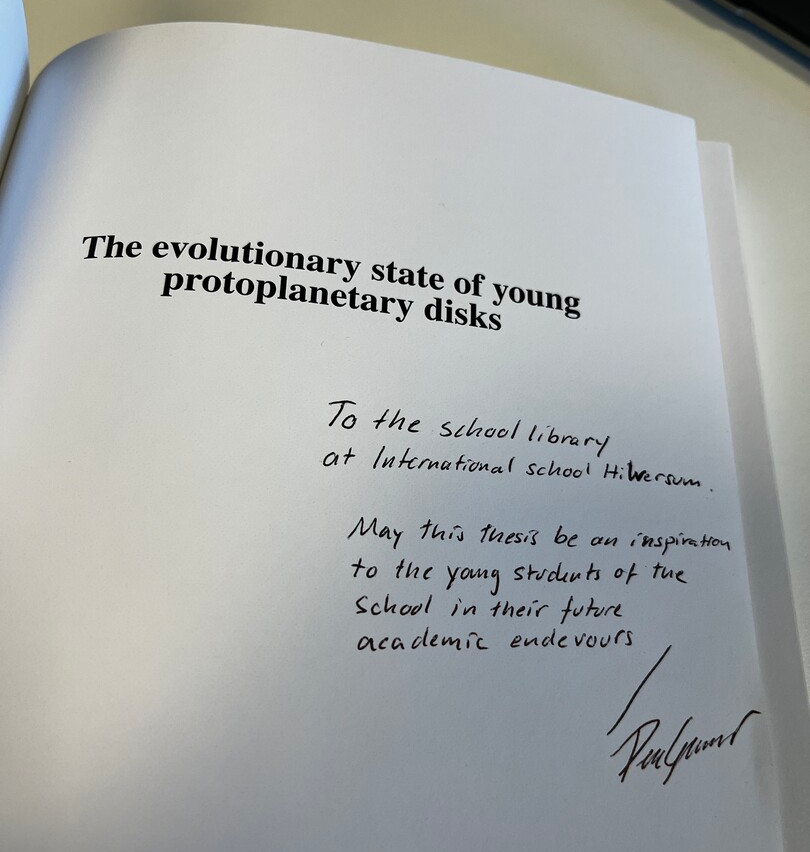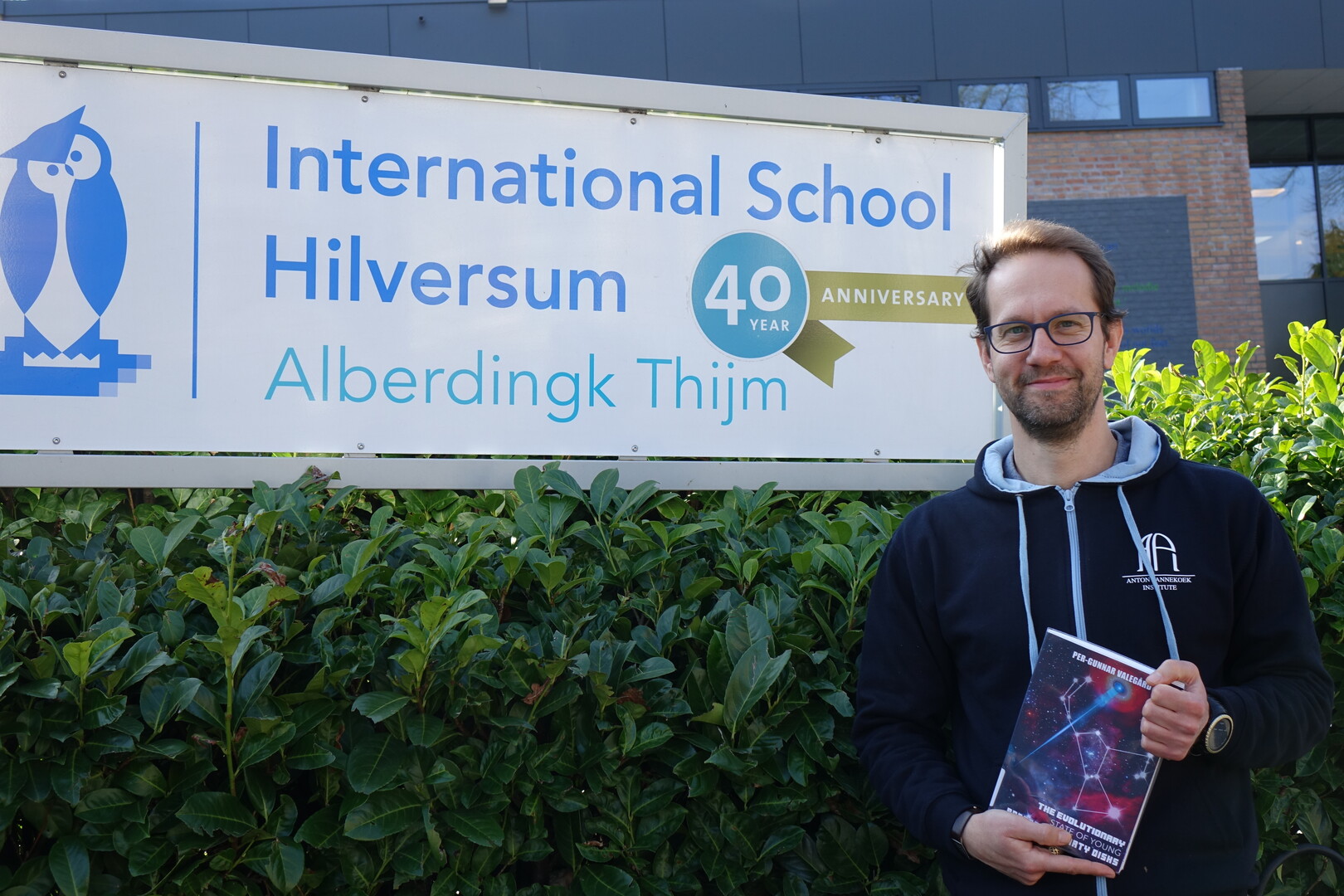Congratulations on finishing your PhD Dr. Valegård! What inspired you to pursue your PhD while teaching? How do you feel this accomplishment enhances your role as a science educator?
The plan I had from the beginning already before I came to the Netherlands was to pursue an academic career in astronomy and astrophysics. Then in the twists and turns of life I ended up teaching, but the idea of research was always in the back of my mind. Then a friend of my wife/partner, who was a chemistry teacher at a Dutch school started to do a PhD next to her work and she gave me the idea that maybe this would still be possible. So, in a way it is a goal I set a long time ago that finally happened.
I think it is important for subject teachers to be able to return to the roots of their subject. Teaching the subject is super but you still need to work on the 'relationship' to the subject to breathe new life in your teaching otherwise you risk ending up just delivering the content and lose your enthusiasm and that's the moment it starts to get difficult to renew yourself. Which I, for myself at least, find very important.
Can you briefly summarize the focus of your doctoral research and its potential implications in the field?
My research focused on young stars surrounded by dust and gas disks which are locations where planets are forming. They represent the nurseries of exo-planetary systems. The processes taking place ultimately mirrors what took place around our own Sun about 4 billion years ago. The stars I have been studying are somewhat more massive than our own Sun. This is because they are brighter, which makes observations of the disks, with the techniques we have used, easier. The results I, or actually we, since collaboration is really important in science, have found are that the evolution of the young stars towards maturity and the evolution of the disks towards planetary systems seems to take place over different timescales. Previously the general idea was that the disk evolves with the star, but it seems like some of the 'older' young stars have quite young-looking disks. Something either keeps the disks young by stopping the evolution (potentially forming planets) or there is some kind of rejuvenation mechanism that keeps disks young.
I also studied a particular target in the sample of stars. In this particular system, RY Tau is a young star in the Taurus constellation which you can see in the Northern hemisphere, one can see the reflected starlight in fine dust that is being launched from the surrounding young gas and dust disk. This is one of the processes that takes place as the disk evolves towards a planetary system which is called a disk wind. It has been theoretically shown that these winds would be hard to observe and that we would likely not see them. I show by creating synthetic observations that what we are seeing very likely can be a disk wind and that the parameter of such a wind are not unreasonable to reproduce the observation.
Finally, I looked at disks around young stars in the Orion star forming region. This region is different than the close by star forming regions in that it contains much more gas and dust, it's more massive, and therefore also contains larger and brighter stars. The large stars are dominating their surroundings by shaping the environment making it hard for smaller stars to keep their disks if they get to close. We wanted to see if we could see any sign of this effect since it cannot be studied in the lower mass, close by regions that lack these giant stars. In the end we did not see any conclusive sign of this in the sample we had but what we did see was that if the systems where double stars or multiple star systems we detected no, or only very tiny disks. This shows something that astronomers suspected in deduction from theory and individual observation but that was now clearly visible to see in our sample of stars.
How do you think your research contributes to the broader scientific community or addresses pressing challenges?
I think that it indirectly impacts the scientific community in that it is basic research, it is driven by our curiosity, and therefore can push instrumentation and observational techniques. Also, it helps putting the pieces together in understanding where our own solar system came from. The idea that our sun formed from a molecular gas cloud and the planets from a dust and gas disk around it is not new, this idea is almost 300 years old. But the details of how it happened and why our solar system looks so different from the planetary systems we see around other stars are still not fully understood.
Could you share some insights into the most significant findings or breakthroughs from your PhD research?
Well, I think I got ahead of myself with this one on the previous question: stars run by a different evolutionary clock than their planet forming disks. Disk winds can possibly be detected under the right circumstances. And yes, we were right, double star systems seldom form planets.
What were some of the biggest challenges you faced during your PhD journey, and how did you overcome them?
To be able to focus on one thing at the time. I think it is more difficult than what one admits to oneself. It took me almost 2 years (out of the 5) to finally be able to efficiently shut out school and family when I was at university and concentrate on research only. To shut out research and family when I did schoolwork and to shut out research and school when spending time with my family.
How do you plan to integrate your research experience into your teaching curriculum or classroom activities?
I hope that renewing my experience in a research project will help me supervise students in their extended essay, their internal assessment as well as their regular studies in physics. We also of course need an astronomy club whose limits are just the inventiveness and interests of its members.
What do you hope your students take away from your journey?
That learning and exploring never stops. When they graduate from IB they are yet only at the beginning. I also hope to show them you are never too old to follow your dreams and that success does not have to happen when you are 25 and done with your Master. In fact, for most of us it happens very much later in life. Of course, success is subjective but let's say it is succeeding with a set goal. My goal was to do research and obtain a PhD in a subject that for me was important and interesting.

Have there been any unexpected or particularly memorable moments that arose from the media attention surrounding your achievement?
Well, I must say that even though I was pre-warned it could happen. I was not really prepared for it. It was a hectic, strange yet very fun week. I do not really see myself as the expert, but to hear myself speaking on Dutch radio as the expert was, I think for me a memorable moment.
Looking ahead, what are your future aspirations or goals in both your teaching career and your continued research endeavors?
I think I will have to let this sink in for a while. The grant I had for my PhD came with a promise to stay in Dutch funded education for at least two years. I will use these two years to decide what to do next. I already know that there are similar grants, for teachers, in the Netherlands for continued research as post-doc. But only time will tell.
Do you have anything you would like to say to your students after all has been done?
Set reachable goals on your way to your own dream or career and realize that very few people reach the final goal early in life. The same goes for your schoolwork. So, learn to set reachable and reasonable goals for yourself based on your abilities and knowledge at the moment. Easy to say of course, but very hard to learn.
Thank you so much Dr. Valegård for your time, effort and commitment to doing what you love! We hope our students are inspired by your journey and benefit from your expertise.



